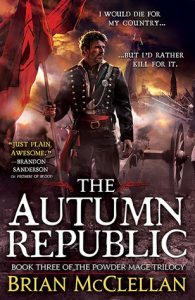The Autumn Republic by Brian McClellan
 Promise of Blood, the first book in the Powder Mage series, caught my attention because it offered something a bit different than the standard fantasy fare I’m accustomed to. Its sequel, The Crimson Campaign, I found to be slightly less compelling than its predecessor; yet it seemed to promise that better things were in store, and The Autumn Republic – the grand finale of McClellan’s flintlock fantasy trilogy – definitely doesn’t disappoint.
Promise of Blood, the first book in the Powder Mage series, caught my attention because it offered something a bit different than the standard fantasy fare I’m accustomed to. Its sequel, The Crimson Campaign, I found to be slightly less compelling than its predecessor; yet it seemed to promise that better things were in store, and The Autumn Republic – the grand finale of McClellan’s flintlock fantasy trilogy – definitely doesn’t disappoint.
The Autumn Republic concludes events set in motion by Field Marshal Tamas’ coup against the king in Promise of Blood. The result of years of planning, Tamas and his advisers are now following the coup by attempting to set up a successful republic in place of the monarchy. But their careful plans have been skewered by the surprise arrival of a foreign power in the capital city of Adopest, a power they are helpless to repel since their own army is away on campaign. The Adrans are fighting a war on several fronts, and to make things worse they now have to attempt to deal with the interference of multiple newly-returned gods of incomprehensible power.
The events of the previous novel, The Crimson Campaign, represented something of a downward arc (storyline-wise) for most of the characters, as they were thrown into huge events and faced with seemingly impossible odds. The Autumn Republic does a stellar job of gradually turning the tables once more, and it’s incredibly satisfying to see many of the characters developing in ways that allow them to overcome their own obstacles and resolve problems using their own unique skills. I was pleasantly surprised to see Nila get a more proactive role in the story, and for her to actually have the opportunity to develop some personality. During the first two books I found her irritating and irrelevant, but now she has both a role and a purpose, which made me more inclined to ignore the fact that her newfound abilities all-too-conveniently appeared out of nowhere.
The pacing of The Autumn Republic is relentless right from the very beginning, much as it was in The Crimson Campaign. This lends a nice feel of continuity following on from the previous book, and helps create the sense of an ongoing military campaign, as do the continual sequences of battles and war-like settings. For the most part this is a positive thing; however, some of the numerous action-heavy sequences can seem a bit dry. I think this is largely due to the author’s tendency to tell rather than show, which makes it feel as though we’re watching from afar rather than from the centre of the action; and the sheer frequency of the battle scenes means that they do become a little bit repetitive. I also feel that perhaps more could have been done with them: the scale of the conflict, particularly some of the larger battles, has the potential to become epic, and yet much of the fighting happens off the page without any sense of tension or climax. Others simply feel as though they are brushed over, with massive engagements involving thousands of combatants described and dismissed in just a couple of lines.
However, there were plenty of other things to keep me hooked. There are a whole bunch of incredible twists and exciting plot reveals that I simply never saw coming, including one particularly pleasant surprise involving the return of a certain favourite character of mine. And Inspector Adamat’s investigation storyline was, for me, once again one of the most compelling threads of the story (in fact, I’d be perfectly happy with a series of novels based around Adamat’s time as a police inspector). That’s not to say the major storyline was anything less than thrilling: its grand conclusion, complete with divine forces and earth-shattering sorcery, is pretty damned epic.
The Autumn Republic is a satisfying conclusion to a very strong debut series, and I look forward to seeing more from McClellan in the future.
